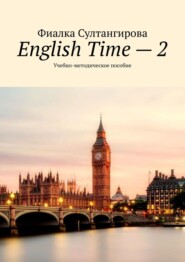скачать книгу бесплатно
8. Is this your brother’s scooter? – Yes, it is (his, hers).
2. Глагол to be в настоящем, прошедшем и будущем временах.
Глагол to be в настоящем времени в предложении не переводится, иногда можно перевести как «есть». Этот глагол имеет 3 формы :
I am
He / She / It is
We / You / They are
Например:
I am a student – Я (есть) студент.
He is a singer. – Он (есть) певец.
We are pupils. – Мы (есть) ученики.
В прошедшем времени глагол to be имеет 2 формы:
I / He / she was был (а)
We / You / They were были
Для будущего времени используется сам глагол:
I / He / She / It / We / You / They will be буду, будет, будем, будут
Спряжение глагола to be.
УПРАЖНЕНИЯ
Вставьте необходимую форму глагола to be.
Упр 1.
1. We …… students.
2. My father …. an engineer.
3. My mother… a doctor.
4. The elephant …. grey.
5. They… drivers.
6. Where …. you from? I …. from Russia.
7. … they from Great Britain? Yes, they ….
8. … she a pilot? Yes, she ….
9. How …. you? I …. fine.
10. The big balls …. on the table.
Упр 2.
1. These dogs… funny.
2. Where… you from? I… from Great Britain.
3. How… your brother? He… fine.
4. … they from Russia? No, they… not.
5. Those horses… brown.
6. How… your sister? She… fine.
7. How… your mother? She… fine.
8. … her aunt a teacher? Yes, she ….
9. My sister… an engineer.
10. We… doctors.
Упр. 3. Вставьте глагол to be в Present, Past или Future Simple.
1. My father… a teacher.
2. He… a pupil twenty years ago.
3. I… a doctor when I grow up.
4. My sister… not… at home tomorrow.
5. She… at school tomorrow.
6. My sister… ill last week.
7. She… not ill now.
8. Yesterday we… at the theatre.
9. When I come home tomorrow, all my family… at home.
10. When my granny… young, she… an actress.
11. My friend… in Moscow now.
12. He… in St. Petersburg tomorrow.
3. Работа с текстом «My Family».
Задание №5 ВПР: Прочитайте текст и вставьте вместо каждого пропуска нужную грамматическую форму, выбрав её из четырёх предложенных вариантов.
A) Our family is neither large nor small. I have a mother, a father and a sister. We all live together in a three-room flat. (A) ______ are friendly.
B) My father Almas Idrisovich is 50 years old. He is a tall and well-built man with short black hair and grey eyes. He works as an engineer. He likes his work and spends most of (B) ______ time there.
C) My mother’s name is Gulnara Failevna. She is a teacher of Mathematics. My mother always has a lot of work to do about the house and at school. She (C) _______ a busy woman and we all help her.
D) Our family is very united. We like to spend time together. In the evenings we watch TV, read books and newspapers, listen to music or just talk about the events of the day.
E) All of (D) ________like to spend our weekends in the country. We often go to the village where our grandparents live. They (E) ______ aged pensioners now, but prefer to live in the country. We are happy when we are together.
A 1) our 2) we 3) us 4) ours
B 1) his 2) he 3) him 4) her
C 1) am 2) is 3) are 4) will be
D 1) ours 2) we 3) us 4) our
E 1) was 2) is 3) will be 4) are
Задание №4 ВПР: Установите соответствие между текстами A – E и их темами, выбрав тему 1 – 6 из списка. Используйте каждую тему только один раз. В задании одна тема лишняя.
This text deals with…
1) our hobbies
2) general information
3) about myself
4) my father
5) our weekends
6) my mother
Занятия №№3—4. 1. Настоящее продолженное время (утвердительные предложения). 2. Работа с картинками (задания №№6 и 3 ВПР)
1. Настоящее продолженное время.
Образование утвердительных предложений в настоящем продолженном времени.
Настоящее продолженное время употребляется, когда речь идет о событиях, которые происходят в данный момент (сейчас).
Слова-маркеры настоящего продолженного времени:
now – сейчас
at the moment – в данный момент
still – все еще
Look! – Посмотри!
Listen! – Послушай!
Правило образования:
За подлежащим, выраженным местоимением или существительным, идет вспомогательный глагол to be и основной глагол с окончанием -ing.
I + am + Ving
He / She / It + is + Ving
We / You / They + are + Ving
Например:
I am dancing now. – Я танцую сейчас.
He is dancing now. – Он танцует сейчас.
They are dancing now. – Они танцуют сейчас.
Есть некоторые правила:
– У глаголов, заканчивающихся на — e, уходит конечная гласная:
come – coming (приходить),
make – making (делать),
write – writing (писать).
– У глаголов, заканчивающихся на — ie, гласные — ie заменяются на — y:
lie —lying (лежать),
tie – tying (завязывать),
